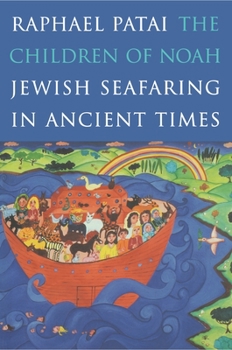The Children of Noah: Jewish Seafaring in Ancient Times
Select Format
Select Condition 
Book Overview
Here the late Raphael Patai (1910-1996) recreates the fascinating world of Jewish seafaring from Noah's voyage through the Diaspora of late antiquity. In a work of pioneering scholarship, Patai weaves together Biblical stories, Talmudic lore, and Midrash literature to bring alive the world of these ancient mariners. As he did in his highly acclaimed book The Jewish Alchemists , Patai explores a subject that has never before been investigated by scholars. Based on nearly sixty years of research, beginning with study he undertook for his doctoral dissertation, The Children of Noah is literally Patai's first book and his last. It is a work of unsurpassed scholarship, but it is accessible to general readers as well as scholars. An abundance of evidence demonstrates the importance of the sea in the lives of Jews throughout early recorded history. Jews built ships, sailed them, fought wars in them, battled storms in them, and lost their lives to the sea. Patai begins with the story of the deluge that is found in Genesis and profiles Noah, the father of all shipbuilders and seafarers. The sea, according to Patai's interpretation, can be seen as an image of the manifestation of God's power, and he reflects on its role in legends and tales of early times. The practical importance of the sea also led to the development of practical institutions, and Patai shows how Jewish seafaring had its own culture and how it influenced the cultures of Mediterranean life as well. Of course, Jewish sailors were subject to the same rabbinical laws as Jews who never set sail, and Patai describes how they went to extreme lengths to remain in adherence, even getting special emendations of laws to allow them to tie knots and adjust rigging on the Sabbath. The Children of Noah is a capstone to an extraordinary career. Patai was both a careful scholar and a gifted storyteller, and this work is at once a vivid history of a neglected aspect of Jewish culture and a treasure trove of sources for further study. It is a stimulating and delightful book.
Format:Hardcover
Language:English
ISBN:0691015805
ISBN13:9780691015804
Release Date:April 1998
Publisher:Princeton University Press
Length:224 Pages
Weight:1.14 lbs.
Dimensions:0.9" x 7.8" x 10.0"
Customer Reviews
1 rating
Interesting Treatment of an Undeveloped Subject
Published by Thriftbooks.com User , 25 years ago
The late Raphael Patai has written an interesting book on an unexpected subject - the seafaring of ancient Israelites and medieval Jews. The semi-nomadic tribes of Israel appear to have settled in the southern Levant highlands in the twelth or thirteenth century BC, while the coasts were controlled by Canaanites, Phoenicians and Philistines. The Hebrew Bible (aka Old Testament) comments only infrequently about the sea, so it is refreshing to read more about a topic only peripherally covered elsewhere (perhaps in specialist literature). Such an effort may be compared to the late Arthur Koesler's _The_Thirteenth_Tribe_ about the Kazarian Jewish converts yielding a source of eastern European Jewry after about the AD 10th century. _The_Children_of_Noah_ integrates scripture, midrash and commentaries from ancient and medieval times to weave a continual if marginal participation of the Hebrews in the seafaring trade. One might be taken aback by the uncritical inclusion of citations from the Book of Mormon, but apparently Patai took his sources where he found them. (Not being Mormon myself, my skepticism of its veracity encourages me to overlook that portion.) According to Patai, Jewish captains and sailors were plying the Mediterranean in significant numbers before and after the fall of Jerusalem. While the diaspora from the Babylonian and Roman conquests had scattered monotheistic Jews across landmasses in southwestern Asia, southern Europe and Egypt, revelation to the reader about how the Jews adapted both culturally and religiously to this nautical opportunity is a welcome experience in broadening one's historical perspective.






